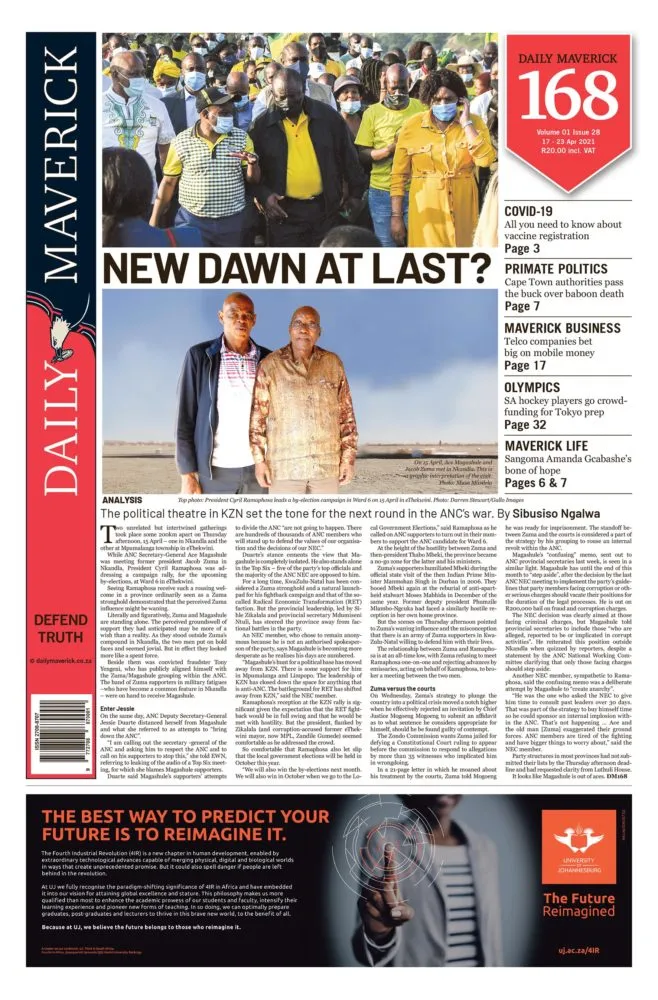First published in the Daily Maverick 168 weekly newspaper.
I often tell the story of my mentor who, in my early years as an entrepreneur, gave me sage advice about not letting any positive press I received go to my head.
“You should never believe what is written about you. For now, they are writing wonderful things, but one day someone will write not-so-nice things about you. And if you believe the good things, you will be encouraged to believe the bad things too. Don’t let the good press go to your head, and don’t let bad press get into your head.”
This has been a guiding axiom for me over the years. I have not only applied it to good and bad press coverage but, more importantly, I have applied it to good and bad news – especially winning or losing a sale or surpassing a competitor in a particular context.
The idea of not allowing oneself to become complacent is clichéd and is covered in countless books on business and entrepreneurship. But what these books do not teach you is how to not become complacent. The literature is filled with lessons of entrepreneurs, far better than me, who fall prey to the intoxication of complacency.
Over my 20 years in Raizcorp, which provides business support for growth-hungry entrepreneurs, I have not been impervious to the surreptitious, subtle and insidiously corrosive spell of complacency. Thank goodness that in all these instances I have woken up quickly enough from each of the trances to which I succumbed.
Sadly, this is not true for many of my friends and fellow entrepreneurs who were beguiled by the allure of complacency until they were forced to sell their fancy sports cars (an indicator of potential complacency) or, worse, their businesses.
Mechanism
The very subtle and slow nature of complacency is what makes it hard to detect and respond to. I needed a mechanism, a rule so to speak, to ensure that I remained alert and healthily paranoid about complacency.
In Andy Grove’s book Only the Paranoid Survive, he demonstrates how, in the technology industry with its high levels of constant innovation, only organisations that are culturally paranoid about becoming irrelevant last the long game.
I remember attending a World Economic Forum talk where the 20-something-year-old Brian Chesky, co-founder and CEO of Airbnb, was interviewed. He was asked what kept him up at night.
His answer was: “A 16-year-old sitting in their bedroom writing a piece of software that will make Airbnb’s software irrelevant.”
Chesky spoke about how the firm constantly tested and retested its assumptions, and strove to continually improve its software to ensure that challengers found it hard to compete. They are paranoid about that 16-year-old.
After feeling the sting of complacency once too often, I decided to create a rule that I call the “double-up rule”. Every time we win an account, we need to double our efforts. Every time we lose a deal, we need to double our efforts. Every time we achieve an internal target, we need to double our efforts, and every time we miss an internal target, we need to double our efforts.
The double-up rule comes paired with the 24-hour rule. If we win a deal, we can celebrate for a maximum of 24 hours and, if we lose a deal, we can feel sorry for ourselves for a maximum of 24 hours.
We do need to celebrate to punctuate our success and we do need to bask in self-pity to help us reflect on and process our failure. But then it’s over. Time to move on, and time to double our efforts.
In my opinion, the more natural of the two double-up responses happens when you lose. You naturally feel upset and can channel that anger into the energy you need to double up.
The caution here is to remove anger from the equation because anger tends to cloud rational thinking and, although it may create the energy, that energy has a high probability of being focused in the wrong direction.
The less natural double-up response comes after succeeding at something. Your feedback from this winning experience is that you have what it takes to win. Doubling up the celebration while in this mindset can, if not checked, result in over-confidence and blindness to potential threats.
Doubling up the effort on positive results requires confident paranoia. Remember, the deal you have just won means that someone else has lost, and they are likely to respond to that experience but, more importantly, they will be learning from their loss, fixing weaknesses and understanding yours better. The next time you are up against them, they may be more formidable opponents.
None of us – and none of our businesses – is immune to the invisible power of complacency. However, those who set up processes, culture and, in particular, rules to ring the bell loudly to wake themselves up when in danger of succumbing to complacency, are the ones who will retain their relevance in the market for decades to come. DM168
This story first appeared in our weekly Daily Maverick 168 newspaper which is available for free to Pick n Pay Smart Shoppers at these Pick n Pay stores.















Comments - Please login in order to comment.